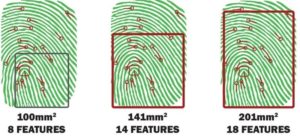 NEXT Biometrics is touting a report indicating that the size of a fingerprint sensor is directly tied to the quality of its performance. The report is the product of a study conducted at the University Carlos III of Madrid; while their initial results were reported in April, the full report is newly released.
NEXT Biometrics is touting a report indicating that the size of a fingerprint sensor is directly tied to the quality of its performance. The report is the product of a study conducted at the University Carlos III of Madrid; while their initial results were reported in April, the full report is newly released.
While the study was initiated by NEXT, the company says it was conducted independently and “under rigorous scientific conditions”. The four-month study involved 589 participants and collected tens of thousands of fingerprint scans. It looked at the accuracy rates of three leading sensors, and then cropped their scans to simulate the effects of a smaller sensor size. In doing so, the researcher, Prof. Raul Sanchez-Reillo, found that false rejection rates increased, in some cases quite dramatically – for example, an FPC sensor’s false rejection rate went from 1.54 percent at its full size to 27 percent when reduced in size by about 57 percent.
For NEXT Biometrics CEO Tore Etholm-Idsøe, the results paint a clear picture: “Laws of nature apply in fingerprinting,” he said in a statement, adding, “A small sensor will only capture a small image containing a small number of time constant data.”
The company’s sensors do indeed offer a robust size, but that’s not to say they’re bulky; they have found their way into many mobile devices, helped along by ‘the Apple effect‘ that saw a number of smaller smartphone makers seek to emulate the iPhone’s Touch ID capabilities. NEXT has also benefited from using production equipment that has allowed it to make its sensors at a low cost, helping it to explore previously untapped markets for fingerprint sensors.
—
May 20, 2015 – by Alex Perala


Follow Us